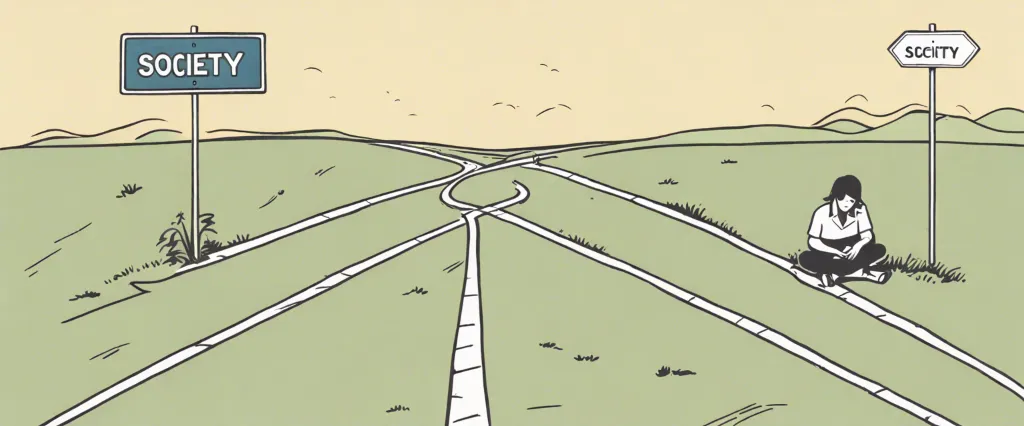
In today’s fast-paced society, where self-improvement and financial security have become paramount, countless books flood the shelves, promising to guide individuals towards a better life. Amid this sea of self-help and personal finance literature, two works have emerged as distinct voices, offering profound insights into the pursuit of happiness and success: “Choose Yourself” by James Altucher and “Enough” by John C. Bogle. These authors approach the topics of self-discovery and financial stability from vastly different perspectives, providing readers with contrasting philosophies and strategies. While Altucher encourages individuals to seize control of their lives by embracing their passions and developing a resilient attitude, Bogle contends that true contentment lies in rejecting our culture’s relentless pursuit of material wealth. In this comparative study, we will delve into the thought-provoking concepts and practical advice these two books present, dissecting their unique perspectives and exploring how they resonate with readers navigating the intricate paths of self-fulfillment and financial well-being. Through an examination of their overarching themes, core messages, and underlying philosophies, we aim to shed light on the divergent approaches to personal success and make connections between the principles espoused in “Choose Yourself” and “Enough”. Ultimately, this comparative study seeks to equip individuals with a comprehensive understanding of these writings, enabling them to embrace the ideas that resonate most deeply with their own aspirations and guiding them towards a more authentic and fulfilling life.
Brief Summary of Two Books
Choose Yourself by James Altucher
“Choose Yourself” by James Altucher is a motivational self-help book that encourages readers to take control of their own lives and embrace personal freedom and fulfillment. Altucher shares his own experiences of hitting rock bottom before realizing that the traditional path to success and happiness was flawed. He urges readers to reject societal expectations, redefine success, and choose themselves.
The book discusses the changing landscape of work, emphasizing that the rules of employment have drastically shifted. Altucher argues that job security is an illusion and that individuals must embrace the entrepreneurial mindset. He encourages readers to create their own opportunities by cultivating multiple income streams and developing unique skills in order to adapt to the fast-changing world.
Altucher emphasizes the importance of self-care and self-improvement on the path to success. He stresses the need to focus on physical and mental well-being, making time for exercise, proper nutrition, and meditation. Through practices such as gratitude and helping others, Altucher suggests that individuals can tap into their true potential and experience a more fulfilling life.
The author also emphasizes the importance of embracing failure and using it as a stepping stone to success. Altucher shares his own failures as well as wisdom gained from successful entrepreneurs, urging readers to start small, experiment, and learn from their mistakes.
Overall, “Choose Yourself” is a call to action for individuals to take charge of their lives, reject societal norms, and pursue their own version of success and happiness. Altucher provides practical advice and personal anecdotes to inspire readers to overcome fear, embrace change, and choose themselves.
Enough by John C Bogle
“Enough: True Measures of Money, Business, and Life” is a thought-provoking book written by John C. Bogle, the founder of The Vanguard Group. In this book, Bogle challenges the prevailing notion of what constitutes success and happiness in our society, particularly focusing on the financial industry.
Bogle argues that our culture has become overly obsessed with an insatiable desire for more, be it money, possessions, or power. He asserts that this constant pursuit of more leads to harmful consequences such as greed, corruption, and inequality. Bogle emphasizes the importance of finding contentment and having a sense of “enough” in all aspects of life.
The author discusses the flaws and pitfalls of the financial industry, criticizing the excessive greed and short-term thinking prevalent among many investment managers. Bogle advocates for a return to the principles of long-term investing and ethical behavior in order to restore trust and maintain stability in the financial markets.
Furthermore, Bogle questions the traditional definition of success that is solely based on accumulating wealth and encourages readers to broaden their perspective. He highlights the importance of meaningful relationships, personal values, and contributing to the greater good. Bogle suggests that true success lies in striking a balance between monetary wealth, personal fulfillment, and societal well-being.
Overall, “Enough” serves as a wake-up call, urging individuals to reassess their priorities and redefine their measures of success. Bogle offers a compelling argument for adopting a more mindful and ethical approach to money, business, and life, ultimately encouraging readers to find contentment and satisfaction with “enough.”
Comparison between Two Books

Similarities in Money
In both “Choose Yourself” by James Altucher and “Enough” by John C. Bogle, the topic of money is explored from different angles, but certain similarities can be drawn in terms of their perspectives and advice.
1. Redefining success with money: Both authors emphasize the need to redefine the traditional notion of success when it comes to money. Altucher argues that choosing oneself and pursuing personal growth, passion, and fulfillment should take precedence over pure financial gains. Bogle echoes this sentiment by suggesting that accumulating excessive wealth is not the ultimate goal, and that finding contentment and peace of mind should be prioritized over endless chasing of money.
2. The importance of self-awareness: Altucher and Bogle both stress the significance of self-awareness when it comes to handling money. Altucher advocates for introspection and understanding one’s personal strengths, interests, and skills to create value and generate income. Bogle encourages readers to reflect on their needs and desires, focusing on what truly brings fulfillment, rather than blindly following societal expectations or engaging in endless consumption.
3. Building alternative income streams: Both books also highlight the importance of diversifying income sources. Altucher discusses the concept of becoming an “idea machine” and constantly generating new ideas to create multiple income streams. On the other hand, Bogle advises readers to invest in low-cost index funds and focus on long-term wealth accumulation through consistent saving and investing.
4. Avoiding the pitfalls of excessive materialism: Altucher and Bogle both warn against the dangers of excessive materialism and its negative impact on overall well-being. Altucher challenges readers to question society’s emphasis on material possessions and instead prioritize experiences and personal growth. Bogle argues against unnecessary consumption and suggests that finding contentment with “enough” can lead to a more balanced and fulfilling life.
5. The importance of taking responsibility for financial decisions: Both authors promote the idea of taking personal responsibility for financial decisions. Altucher emphasizes the need to adapt to changing economic circumstances, accept failures, and learn from them. Bogle highlights the importance of taking a long-term approach to investing and not succumbing to short-term market fluctuations.
While “Choose Yourself” by James Altucher and “Enough” by John C. Bogle approach the topic of money from different perspectives, they converge on the ideas of redefining success, self-awareness, diversifying income, avoiding excessive materialism, and taking responsibility for financial decisions. These similarities make both books valuable resources for readers seeking a more holistic and healthy approach to money management.
Divergences in Money
“Choose Yourself” by James Altucher and “Enough” by John C. Bogle are two books that explore different perspectives on money and personal finance. While both authors tackle the subject of financial success, they diverge in their approaches and viewpoints.
In “Choose Yourself,” Altucher emphasizes a more non-traditional and entrepreneurial mindset towards making money. He argues that in the modern world, individuals have the power to create their own opportunities and succeed by being resilient, adaptable, and innovative. Altucher focuses on the importance of self-improvement and personal growth, claiming that by continuously learning and developing new skills, individuals can have greater control over their financial outcomes. This book encourages readers to embrace risk-taking, explore multiple income streams, and prioritize their own well-being as they strive for financial independence.
On the other hand, Bogle’s “Enough” takes a more prudent and conservative approach to money. Bogle, the founder of Vanguard Group and a legendary figure in the investment industry, advocates for a long-term, low-cost investment strategy that centers around index funds. He emphasizes the importance of avoiding excessive risk, high fees, and market timing in investing. Bogle also highlights the significance of not measuring one’s worth solely through material possessions or the accumulation of wealth but instead finding contentment and satisfaction with what one already has. This book urges readers to focus on their financial goals, live within their means, and appreciate the concept of “enough” rather than constantly striving for more.
From a divergence standpoint, the approach to money in these books differs in terms of risk-taking, mindset, and investment strategies. Altucher encourages readers to embrace risks and pursue unconventional paths to financial success, whereas Bogle emphasizes a more stable, conservative approach to investing. Altucher’s mindset is focused on personal growth and adaptability, while Bogle’s perspective is centered around contentment and smart investment practices. Furthermore, “Choose Yourself” promotes the idea of self-determination and creating one’s opportunities, while “Enough” emphasizes finding fulfillment beyond material wealth and focusing on more holistic measures of success.
In conclusion, “Choose Yourself” and “Enough” offer contrasting perspectives on money and personal finance. While Altucher’s book encourages risk-taking and entrepreneurial spirit, Bogle’s work advocates for a conservative, low-cost investment strategy while finding contentment with one’s financial status. Both books provide valuable insights and can be seen as complementary approaches to achieving financial well-being and a sense of fulfillment.

Conclusion
Both “Choose Yourself” by James Altucher and “Enough” by John C. Bogle are highly regarded and worth reading, but they have different focuses and appeal to different audiences.
“Choose Yourself” is a book that promotes personal empowerment and emphasizes the importance of taking control of one’s life and career. Altucher encourages readers to embrace entrepreneurship, think creatively, and prioritize self-care. It offers valuable insights and practical advice for individuals seeking ways to thrive in a rapidly changing world.
On the other hand, “Enough” by John C. Bogle delves into the realm of finance and investing. Bogle, the founder of Vanguard Group, shares his wisdom and experience as he explores the concept of “enough” in relation to our financial lives. He argues against the excessive pursuit of wealth and provides a strong case for simple, long-term investment strategies like index funds.
Ultimately, the choice between the two books depends on your personal interests and needs. If you are looking for guidance in personal development, entrepreneurship, and self-improvement, “Choose Yourself” may be more suitable. However, if you are interested in financial planning and investing, “Enough” offers valuable insights from a renowned industry expert.


